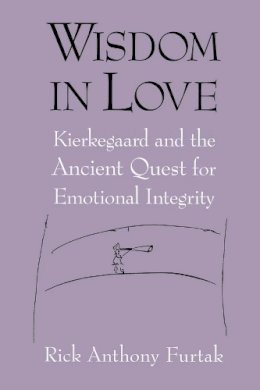
Wisdom in Love: Kierkegaard and the Ancient Quest for Emotional Integrity
Rick Anthony Furtak
In this historically-informed work in moral psychology, Rick Anthony Furtak develops a conceptual account of the emotions that addresses the conventional idea that reason and emotion stand in sharp opposition. Furtak begins with a critical examination of the ancient Stoic position that emotions ought to be avoided by rational human beings. He argues that, on the contrary, emotions ought to be understood as embodying a kind of authentic insight, which enables us to attain a meaningful and truthful way of seeing the world.
Furtak's positive alternative to Stoicism draws heavily on the writings of Søren Kierkegaard, particularly "Either/Or" and "Works of Love," while also engaging with a wide range of other relevant philosophical, literary, and religious sources. He argues that a morality of virtue and narrative awareness is necessary for accurate emotional perception, and then attempts to define a qualified value realism based upon a reverential trust in love as the ground of life as we know it. The outcome of this inquiry into the possibility of reliable emotion is an account of the ideal state in which a person could trust himself or herself to be rational in being passionate.
Wisdom in Love makes an original contribution to the philosophy of the emotions and provides a new and compelling interpretation of Kierkegaard’s work as a whole.
Product Details
About Rick Anthony Furtak
Reviews for Wisdom in Love: Kierkegaard and the Ancient Quest for Emotional Integrity
by undergraduates, even as it will reward philosophers who are specialists in moral psychology, Greek Philosophy, Kierkegaard, or 19th Century Post-Kantian thought. It displays an exemplary command of secondary and primary sources, and offers a veritable trove in footnotes."—Notre Dame Philosophical Reviews “At the heart of this conception is an interpretation of love as a basic and general disposition to perceive things in the world as unconditionally valuable. It is especially to be noted for the disciplined pathos of Furtak's writing. The book bristles with highly suggestive and often illuminating literary examples and illusions.” —Philosophy in Review “Although Kierkegaard is at the center of Furtak's study, the larger theoretical interest of the book is to develop a philosophy 'according to which the emotions can be understood as embodying a kind of authentic insight-even, perhaps, enabling us to attain a uniquely truthful way of seeing the world.'” —Journal of American Academy of Religion "One of the most laudable features of this analysis is how Furtak allows the esthete to respond in kind before moving on to the religious point of view. . . Furtak's approach to the religious point of view is not only the most controversial aspect of Wisdom in Love but also of Kierkegaard's writing all told. The debate is over how detached and unemotional religious individuals are portrayed, how engaged by particular worldly aspirations they are supposed to be." —Christianity and Literature
